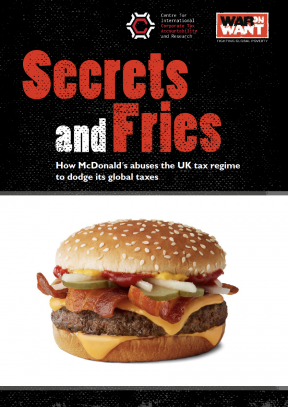Secrets and Fries

In 2016, a UK-based McDonald’s subsidiary, McD Global Franchising Ltd, purchased intangible assets from a Singapore-registered subsidiary. The payment, made using loan notes, circled the globe through McDonald’s subsidiaries in three continents until it was eventually returned back to McD Global Franchising Ltd. The transaction enabled McD Global Franchising Ltd to claim an expense for issuing the loan notes, but no corresponding taxable income when the loan notes were returned to it as a dividend. The loan notes and the debt they created were cancelled and amortisation could be claimed over at least ten years.
This transaction enables billions in royalties that McD Global Franchising Ltd receives from McDonald’s entities around the world to be shielded from taxation in the UK, depriving UK public funds of at least $400 million (£295million) in tax revenue from one of the world’s largest multinationals.
These revelations mark a new chapter in the evolution of McDonald’s aggressive tax strategies highlighted by previous reports: The Unhappy Meal; Unhappier Meal; and The Golden Dodges. McDonald’s widespread use of franchising enables it to easily manipulate and move the location of intangible assets, including its intellectual property, for which royalty fees are paid by franchisees. Locating these assets and hence, collecting royalty income, in low tax jurisdictions helps McDonald’s reduce the tax it pays and denies local communities the public funds needed to support public services.
The report calls on Her Majesty’s Revenue and Customs (HMRC), the UK’s tax authority, to rigorously investigate McDonald’s affairs and for policy makers to address the City of London’s role as a tax haven for McDonald’s and other multinationals.
These findings are further evidence that McDonald’s business model drives inequality and demonstrates the need to rebalance economic rule-making in favour of the workers and the communities in which McDonald’s and other multinational corporations operate. Workers and their communities deserve a fair share of the wealth they produce. It is time for McDonald’s to end its aggressive tax strategies.
